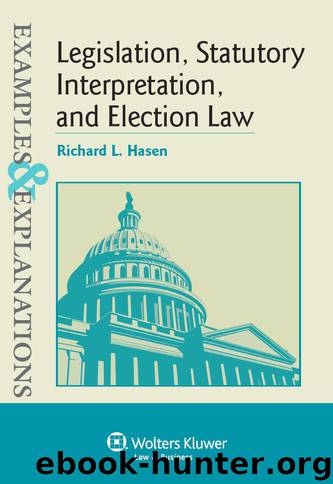Examples & Explanations: Legislation, Statutory Interpretation, and Election Law by Richard L. Hasen

Author:Richard L. Hasen [Hasen, Richard L.]
Language: eng
Format: epub
Publisher: Wolters Kluwer Law & Business
Published: 2014-07-11T00:00:00+00:00
The Court then turned to Skidmore deference and concluded that the agency was entitled to no Skidmore deference, because its statutory analysis advanced in the amicus brief was “wholly unpersuasive.”
Ultimately, applying “traditional tools of interpretation to determine whether petitioners are exempt outside salesmen,” the Court majority concluded the representatives qualified as outside salesmen and were not entitled to overtime pay.
Justice Breyer, writing for the four dissenting justices, reached a contrary conclusion on whether representatives qualified as outside salesmen, but he agreed with the Court’s refusal to give deference to the DOL’s position advanced in the amicus brief:
In light of important, near-contemporaneous differences in the Justice Department’s views as to the meaning of relevant Labor Department regulations, I also agree that we should not give the Solicitor General’s current interpretive view any especially favorable weight. Thus, I am willing to assume, with the Court, that we should determine whether the statutory term covers the detailer’s job as here described through our independent examination of the statute’s language and the related Labor Department regulations. But, I conclude on that basis that a detailer is not an “outside salesman.”
In the end, it seems fair to note that the question of deference or not made no difference in this case, because the majority and dissent both decided that deference was inappropriate. Both sides reached this conclusion despite the earlier Auer case, which generally supported deference to an agency’s interpretation of its own regulations even if advanced in a legal brief. A better predictor of the justice’s votes in the case is not the level of deference to agency interpretation but instead his or her ideology: The five conservative justices sided with an employer to oppose overtime for pharmaceutical representatives, whereas the four liberal justices sided with the employees and in favor of overtime.
So don’t get too hung up on the precise level of deference, and remember: In cases involving important public policy issues, the judges’ (or justices’) views may matter a whole lot more than the agency’s position on the issue.
Download
This site does not store any files on its server. We only index and link to content provided by other sites. Please contact the content providers to delete copyright contents if any and email us, we'll remove relevant links or contents immediately.
Objection! by Nancy Grace(1782)
Apeirogon by Colum McCann(1704)
Anatomy of Injustice by Raymond Bonner(1668)
That Every Man Be Armed by Stephen P. Halbrook(1582)
Civil Procedure (Aspen Casebooks) by Stephen C. Yeazell(1556)
The Vaccine Court by Rohde Wayne(1512)
Injustices by Ian Millhiser(1501)
Storytelling for Lawyers by Meyer Philip(1466)
A Practical Guide to International Arbitration in London by Hilary Heilbron(1441)
Restitution by Restitution(1427)
Coercing Virtue by Robert H. Bork(1361)
Broken Scales by Joel Cohen(1353)
Tangled Webs: How False Statements Are Undermining America: From Martha Stewart to Bernie Madoff by James B. Stewart(1339)
The Tools of Argument: How the Best Lawyers Think, Argue, and Win by Joel Trachtman(1318)
A Matter of Interpretation by Antonin Scalia(1316)
INDEFENSIBLE: One Lawyer's Journey Into the Inferno of American Justice by Feige David(1293)
American Tragedy by Lawrence Schiller & James Willwerth(1276)
A Religious Orgy in Tennessee by H.L. Mencken(1255)
Tangled Webs by James B. Stewart(1248)
